|
|
|
Sort Order |
|
|
|
Items / Page
|
|
|
|
|
|
|
| Srl | Item |
| 1 |
ID:
141593
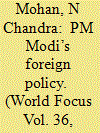

|
|
|
|
|
| Summary/Abstract |
Prime Minister Narendra Modi’s foreign policy has been credited with more achievements than the NDA government’s policies to turnaround the Indian economy. What is so distinctive about his foreign policy? Has he blazed a different trail from his predecessor, Dr Manmohan Singh? Economic diplomacy is a forte they have in common. Both enjoy their foreign travels. During his first year in office, PM Modi visited 17 countries and spent 53 days abroad. This is not very different from Dr Singh’s frequent flyer miles during UPA-11 when he visited 12 countries and spent 47 days outside
|
|
|
|
|
|
|
|
|
|
|
|
|
|
|
|
| 2 |
ID:
141589
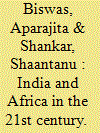

|
|
|
|
|
| Summary/Abstract |
India-Africa relations have evolved dynamically and continuously over the years, having exhibited both change and continuity. During the colonial period, engagement was dictated by the colonial administrators as primary actors. It is only in the post-Colonial phase that formal relations were established between national representative governments. Soon after India’s independence Indo-African interaction focused on the liberation of African countries and only in the post-Cold War era, with the emergence of both India and a large number of African countries as liberal global economies, have relations truly expanded and developed.
|
|
|
|
|
|
|
|
|
|
|
|
|
|
|
|
| 3 |
ID:
141598
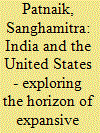

|
|
|
|
|
| Summary/Abstract |
The Indo- US relations represent a new landmark in the changed international scenario. They are the proud fore- runners of the two most populous democracies of the world. The determined effort of the US administration to assist in India’s rise as a major power has significant implications for US interests in Asia in general and South Asia in particular. The collapse of the Soviet Union had changed the balance of power. Every country including India is looking for an appropriate place in this changed scenario. The Indo – US partnership that had made a new beginning during the latter part of the Clinton Administration that reached a new high to build up new security architecture in Asia. The 2005 US-India agreement showed their resolve to establish a “global partnership” through increased cooperation on various issues. It is interesting to analyze the dynamics of Indo-US relations under a new government led by the Indian Prime Minister Narendra Modi.
|
|
|
|
|
|
|
|
|
|
|
|
|
|
|
|
| 4 |
ID:
141590
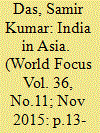

|
|
|
|
|
| Summary/Abstract |
With the emergence of India as an ‘Asian leader’, India’s Northeast has acquired both strategic and cultural importance particularly in recent years. While much has been written on the strategic part of India’s Asia policy with the obvious focus on the need for containing China, correspondingly very little – if anything - is written on either the cultural importance of Asia to India or similar importance of India to other Asian countries. For one thing, cultural dimensions are viewed in foreign policy circles as ‘soft power’ assets that can be deployed and mobilized at one’s will in order to accomplish strategic objectives. For another, culture is viewed in these circles not only in instrumentalist terms but also as an undifferentiated whole that pertains to the nation as an equally seamless entity.
|
|
|
|
|
|
|
|
|
|
|
|
|
|
|
|
| 5 |
ID:
141607
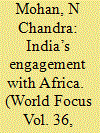

|
|
|
|
|
| Summary/Abstract |
The overarching objective of the three India-Africa Forum Summits since 2008 is to develop a new architecture for a structured engagement between India and Africa. They constitute a vital platform to engage with Africa at regional, sub-regional and bilateral levels. Our bilateral relations closely approximate the modern concept of development compact that is based on shared responsibility and helping one another meet their developmental goals. This compact is more South-South than North-South as it entails mutual gain, non-interference, collective growth opportunities and indeed an absence of loan conditionalities.
|
|
|
|
|
|
|
|
|
|
|
|
|
|
|
|
| 6 |
ID:
141592
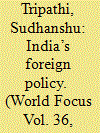

|
|
|
|
|
| Summary/Abstract |
India’s Foreign Policy, under its first Prime Minister Nehru, had been well-known for its strict adherence to non-alignment vis-à-vis international conflict while focusing on anti-colonialism, anti-imperialism, anti-racialism and apartheid besides world peace through panchsheel. This pacifist diplomacy was neither to result into blind submission or compliance of super or major powers nor should it prevent the development of strategic alliances that strengthen the country’s position in the international system. In fact, it was particularly aimed at achieving self-sufficiency for ensuring the country’s economic development as a precondition of political and social progress, stability and harmony. Perhaps Nehru had no faith in free trade, globalization and economic liberalization and foreign investment as instruments of socio-economic progress. Later Prime Ministers Lal Bahadur Shastri, Indira Gandhi and Rajiv Gandhi abandoned the idealistic vision of Pt. Nehru and pursued a more realistic foreign policy for securing the country’s national interests in the World. After the demise of Cold War, the foreign policy under PM NarasimhaRao and Dr.Manmohan Singh took several new steps like supporting globalization and economic liberalization, close cooperation or strategic partnership with the United States, forging ties with Israel and many more. India has now drawn lessons through various unprecedented incidents at the international level that the road to socio-economic development passes only through globalization and liberalization and global interconnectedness and interdependency. This was stated by PM Manmohan Singh: “Our government has
|
|
|
|
|
|
|
|
|
|
|
|
|
|
|
|
| 7 |
ID:
141599
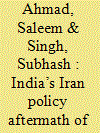

|
|
|
|
|
| Summary/Abstract |
After years of discussions and debates on whether Iran should be freed from restrictions and sanctions which had been imposed 12 years ago, the Islamic Republic finally got some relief when the P5+1 signed a nuclear deal with it. For Iran, it was like breaking down a wall that did not allow any progress in the country and crippled its economy. But the United States of America is still analyzing on whether what it did was right, and countries like Russia, China and India are rejoicing very much. On July 14, 2015, Iran and six world powers signed the agreement in exchange to limit its nuclear programme. The agreement allows for the country’s civil nuclear infrastructure to remain intact, sanctions against banks and exports to be lifted, and an arms embargo removed, to be replaced with five-year restrictions on arms-buying. However, in return, it has been clearly stated that “under no circumstances will Iran ever seek, develop or acquire any nuclear weapons”. For India, Iran’s nuclear deal will have some challenges and opportunities in its relations. Iran’s prolonged tussle with the West and the subsequent sanctions on its economy had been inconvenient for India.
|
|
|
|
|
|
|
|
|
|
|
|
|
|
|
|
| 8 |
ID:
141591


|
|
|
|
|
| Summary/Abstract |
With the fast changing world geo-political scenario, it is becoming really challenging for the developing counties like India to keep pace with the new situations being developed. So far the Prime Minister Modi’s Government has done well in its foreign policy but would have to put in more efforts to do its homework better so as to fulfil the promises it has made. Since assuming office, the Prime Minister has pursued a vigorous foreign policy agenda with visits to a host of major countries as well as to several states in India’s immediate neighbourhood. Does the vigour that Modi has brought to India’s foreign policy reflect a fundamental shift or are these changes merely cosmetic? The question is far from trivial. At a time when China is pursuing an increasingly assertive foreign policy, when the future of the American re-balancing strategy is unclear and with much of the Middle East aflame, India’s foreign policy choices will have considerable bearing on the country’s overall fortunes. Mr Modi still has to articulate a framework for dealing with contending priorities in certain parts of the world.
|
|
|
|
|
|
|
|
|
|
|
|
|
|
|
|
| 9 |
ID:
141601
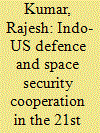

|
|
|
|
|
| Summary/Abstract |
In last one and a quarter decade, it has been seen that successive U.S. governments have sold high-tech arms and military equipment to the Indian government. The momentum for sale of such high technological equipments could be seen from the culmination of Indo-U.S. nuclear deal in 2008. The transfer process has been made easier and the long delays have been reduced and most of the sale is taking through government to government route only. In past such practices could not have ever been imagined. It is this development which has brought important turnaround within their bilateral relations specially, defence cooperation.
|
|
|
|
|
|
|
|
|
|
|
|
|
|
|
|
| 10 |
ID:
141605


|
|
|
|
|
| Summary/Abstract |
For more than one and half decades, India's foreign policy was largely designed, decided and determined by the Prime Minister Pandit Jawaharlal Nehru. He was also the foreign Minister of India along with the position of Prime Minister. India's position during the Cold War period was mainly determined by Jawaharlal Nehru. However with his demise, there was hardly any leader with his stature who could convince the political leaders and Indian people about the future of India. India's journey from 1947 till the present day, both in the terms of foreign policy and domestic politics, can be seen as a transition from idealism under Nehru, through a period of hard realism lasting roughly from the mid-1960s to mid 1980s to economically driven pragmatism today. Hence, Indian Foreign policies were determined by numerous non-state actors and other elements which gained momentum during the course of time.
|
|
|
|
|
|
|
|
|
|
|
|
|
|
|
|
| 11 |
ID:
141596
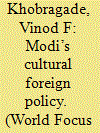

|
|
|
|
|
| Summary/Abstract |
The Culture, Values and Ideas play major role in the foreign policy of the states. The culture has no boundaries and is transformed to win over the hearts of the people around the world. The Cultural diplomacy is a very important means of foreign policy of the country to promote the International linkages. In other words, the cultural diplomacy helps in bringing cordial and hearty relations amongst the people across the world. Cultural diplomacy is seen in terms of ‘Soft Power’, the term which was coined and popularized by Joseph Nye to describe the US’s foreign policy strategy.
|
|
|
|
|
|
|
|
|
|
|
|
|
|
|
|
| 12 |
ID:
141597


|
|
|
|
|
| Summary/Abstract |
In recent times under Prime Minister Narendra Modi’s stewardship we are witnessing changes that have tremendous importance from the perspective of India’s security and foreign policy. At the fag-end of August, Smt. Sushma Swaraj, Union Minister of External Affairs, had a three nation’s tour of Germany, Egypt and UAE. Egypt and UAE are reckoned as big brothers among the Muslim fraternity in the West and through them we can learn what they are thinking especially after the US-Iran Nuke deal. Modi himself visited UAE in August which has already won laurels from diplomatic circles at home and abroad. Taking cue from these, one might think of a possible strategic shift in India's foreign policy henceforth towards the West which means that India is trying to play a balancing role in the Middle-East compared to her hitherto intense engagements with the eastern states, often euphemistically paraphrased in diplomatic parlance as Look East Policy.
|
|
|
|
|
|
|
|
|
|
|
|
|
|
|
|
| 13 |
ID:
141602


|
|
|
|
|
| Summary/Abstract |
Somewhere between the foreign visits and eloquent speeches, Prime Minister Narendra Modi managed to alter – albeit slightly – the narrative about India’s status in the international order. Thanks to the reach of social media and the internet generation, it is safe to say, that, India has managed to capture global attention. Will this attention grabbing strategy translate to changes on ground? Will India soar above its present status as a dominant power in South Asia to emerge as a Great power in the future? Can India take charge of the ‘Asian Century’?
|
|
|
|
|
|
|
|
|
|
|
|
|
|
|
|
| 14 |
ID:
141600
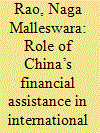

|
|
|
|
|
| Summary/Abstract |
The movement of money fromone country to another country for development in the formof aid is known as the foreign aid. The Foreign capital or assistancehelps to reduce the shortage of domestic savings of the recipientstate. This willensuretheinflow of capital, equipment, technology and raw materials thereby raising of capital formation in the country.
|
|
|
|
|
|
|
|
|
|
|
|
|
|
|
|
| 15 |
ID:
141604
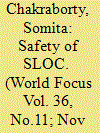

|
|
|
|
|
| Summary/Abstract |
In the post Cold War era, India’s growing diplomatic initiative and naval presence in different ports of Indian Ocean and western Pacific for the protection of its vital sea lanes received tremendous international attention. Much of the existing literature regards this as an exercise of power projection, ignoring the economic dimension as well as diplomatic initiatives taken by India for the safety of its vital sea lanes.
|
|
|
|
|
|
|
|
|
|
|
|
|
|
|
|
| 16 |
ID:
141606


|
|
|
|
|
| Summary/Abstract |
The relationship between India and The United States is undergoing a significant transformation. This has been made possible due to a shift in the US nuclear policy towards India. The nuclear issue has always been a source of irritant between the two countries. The US move to conclude a civil nuclear agreement with a non-nuclear state, was a surprise for many states. Changed US nuclear policy is seen as an opportunity for India to have access to advanced nuclear technology. This paper analyses the factors that led The United States to take a positive view of India’s nuclear programme and take the relationship to a much higher level
|
|
|
|
|
|
|
|
|
|
|
|
|
|
|
|
| 17 |
ID:
141594
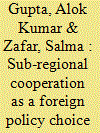

|
|
|
|
|
| Summary/Abstract |
Several factors have acted as bottleneck towards regional integration within South Asian Association for Regional Cooperation (SAARC). It ranges from Indo-Pak hostility and motivated Chinese interventions to ‘big brother small brother’ syndrome within the region. Accordingly, economic integration at the behest of SAARC as a Regional Organization has always been questioned and has largely been rendered failure. South Asia is the fastest growing region in the world. The combined economy of the SAARC countries is the third largest in the world in terms of GDP (PPP), with US and China ahead of it. According to South Asia Economic Focus report brought out by World Bank, regional growth is projected to increase from 7 percent in 2015 to 7.6 percent by 2017 with the increase in investments and steady rise in consumption patterns.
|
|
|
|
|
|
|
|
|
|
|
|
|
|
|
|
| 18 |
ID:
141595
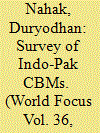

|
|
|
|
|
| Summary/Abstract |
Despite tense atmosphere that continues to prevail between India and Pakistan since Mumbai terror plot 2008, the hopes to build an atmosphere of peace and confidence between them have not been jettisoned. Their relations are marred by confrontation, crisis, and conflict but they have agreed upon and signed a great deal of CBMs since Independence. In the era of nuclear, chemical and cruise missile in the hands of nation states in general, and India and Pakistan in particular, CBMs seem to be alternative weapons to guarantee peace and security in the interest of humanity. In initial years of partition, the challenges for the political leadership of both the countries were many, for that purpose, they had put their endeavours to resolve all the minor disputes arising out of partition.
|
|
|
|
|
|
|
|
|
|
|
|
|
|
|
|
| 19 |
ID:
141603


|
|
|
|
|
| Summary/Abstract |
India as an extended neighbour of Central Asia countries has major geo-strategic and economic interests in this region. Peace and security in Central Asia and Afghanistan seems to be the most crucial factor in realizing India’s thrust for energy security in Central Asia. The evolution and development of India-central Asia relationship stands on the pillar of strong reciprocal historical, cultural and civilizational bond and affiliations. The importance of central Asia to India and vice versa took new shape after the disintegration of the Soviet Union. From Indian perspective, the importance of Central Asia not only lanced through its interaction of historical, cultural and civilizational gains and benefits, rather the realization of its geo-strategic and economic interest. India has vital interests in Central Asia which can be achieved through a secure and stable central Asia. The mounting security concern in Central Asia as exhibited by the forces of religious extremism, international terrorism and drug-trafficking had has serious consequence in destabilizing peace and stability in both India and Central Asia.
|
|
|
|
|
|
|
|
|
|
|
|
|
|
|
|
|
|
|
|
|